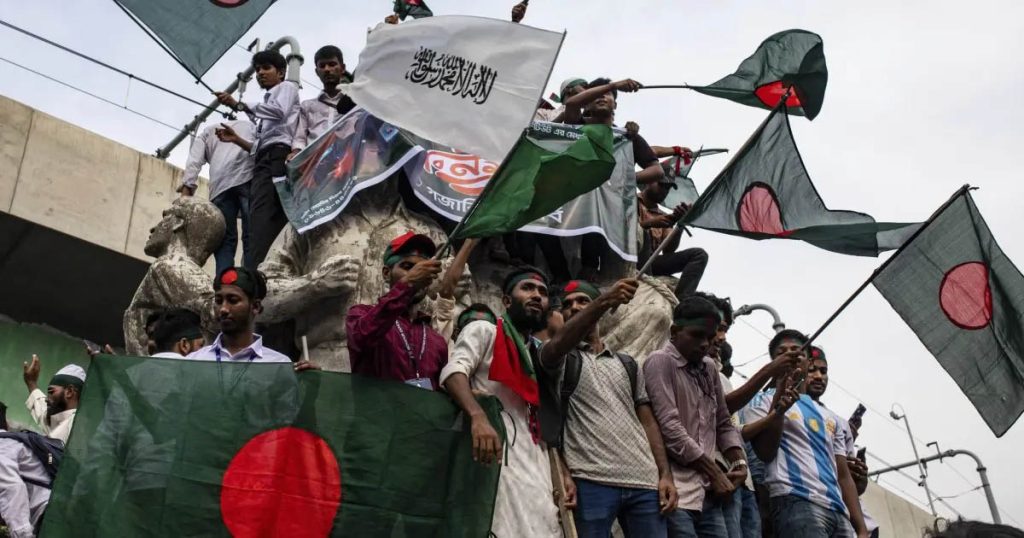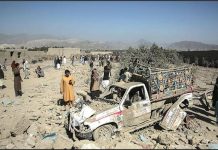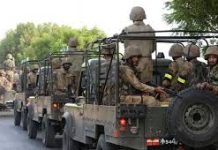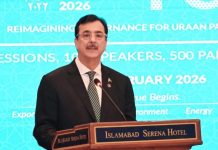
Swadesh Roy
(www.thenewslark.com)
Nearly fourteen months have passed under the interim administration led by Dr. Muhammad Yunus in Bangladesh. Fourteen months is not a short period for any government. Yet within this time, two of the most critical failures that have surfaced in Bangladesh are: the inability to ensure economic security and the push to the brink of public safety.
When Muhammad Yunus assumed responsibility for Bangladesh’s interim governance, the country’s GDP growth stood at 6.5, or, according to some agencies, 6.7. Currently, according to the IMF, it is 3.3 — a number that may decline even further by the end of the year. At the same time, the international rating agency Moody’s has downgraded Bangladesh to a negative B-2 rating. As the governor of Bangladesh’s central bank remarked, this downgrade is akin to “hammering the final nail into the coffin of the country’s efforts to revive the economy.”
Bangladesh’s GDP trajectory, its standing with international rating agencies, and even the governor’s downgrade to a “C” position collectively make it clear that this interim arrangement is incapable of ensuring the country’s economic security.
Furthermore, over the past fourteen months, the interim administration has been far more focused on eliminating the Awami League — the political party whose government they effectively removed from power — than on addressing the country’s economic challenges. Not even one percent of the attention devoted to dismantling the Awami League has been spent on the economy.
The primary cause behind their failures or misdirection is the absence of political personalities within this government. All members are non-political, and Dr. Muhammad Yunus himself was the head of a non-government organization, a sphere that instinctively views politics with suspicion or disdain. Additionally, he harbored long-standing personal hostility toward the former Prime Minister Sheikh Hasina, who had implicated him in multiple cases and even sentenced him.

As a result, careful observation of their activities over the past fourteen months reveals that they have spent most of their time trying to weaken Sheikh Hasina and her party, the Awami League.
Not once did they consider that weakening the most unpopular political party with the smallest mass base must be done politically, not administratively. They failed to learn even from Sheikh Hasina’s own mistakes — the moment she abandoned political confrontation and adopted administrative measures to combat political opposition, her decline began.
On the other hand, during the movement that brought this interim arrangement to power, many police personnel and members of the state’s elite force, the Rapid Action Battalion (RAB), were killed at the hands of protesters. Among the dead were several members of the armed forces. A large number of government establishments and private businesses were destroyed through arson attacks.
In any state, no matter who commits the killing of law enforcement officials, they must be brought to justice. And under state law, the government is obligated to ensure such justice.
But instead of prosecuting the killers, the current interim administration has granted them indemnity. The door to prosecuting state-recognized killers has been officially closed. Although the constitutionality of such an indemnity is outside the scope of this discussion, the fact remains that the judiciary has been bypassed.
However, by halting the prosecution of those who killed police and RAB personnel, the government has had to make a different set of decisions — outside the bounds of law. Although the government attempted to place individuals supportive of the interim authority in higher positions within the police, everyone must acknowledge a fundamental truth: a considerable number of law-enforcement officers — 44 according to the government, and several thousand according to various private organizations and political groups — were killed. Protesters attacked and set fire to more than 460 police stations, resulting in significant casualties. It must be recognized that when such killings and organized attacks occur, the psychological state of the force changes.

No reasonable person can believe that, after granting indemnity to those who killed police officers, the administration can still rely on the police to govern the state. Muhammad Yunus is an intelligent man — he did not make that mistake.
Instead, he chose to mobilize the students who had participated in the movement demanding reform of the quota system. Rather than enabling them to return to their studies or careers, he set them on the path to form a political party quickly—and succeeded. Yunus surely understands that such parties do not gain real public support. But through this, he achieved his primary objective: keeping the students on the streets as a private force. They now act as a mob, confronting opponents of the government whenever necessary.
Whenever something beyond the law is encouraged, its speed accelerates. Climbing down from a tree is always faster than climbing up. In the same way, in any society, breaking discipline is far easier than establishing discipline. And this too becomes contagious.
Thus, mob violence has spread across Bangladesh like a contagious disease. And this mob violence is no longer confined to the private force created by those students. It has now proliferated through various mercenary groups across the country. It is happening both openly and silently.
Whenever such a social condition emerges within a state, the first to be affected are the minority communities. In Bangladesh, minorities were initially attacked directly; now they face silent extortion. Members of the private force and various mercenary groups quietly collect money from them, and minorities are compelled to pay to survive.
Such a contagious phenomenon spreads rapidly in any society. As a result, extorting money from business owners has become an unwritten, silent practice. Small businesses in remote areas are increasingly falling into crisis. Even the service sector has not remained outside the reach of this extortion.
Naturally, wherever financial interests become intertwined and certain groups operate above the law, the situation never remains limited to a single group. Multiple groups then enter this illegal marketplace of extracting money.
As evidence of this, until last October, more than 140 local-level leaders of the Bangladesh Nationalist Party (BNP), one of Bangladesh’s major political parties, were killed by unknown assailants. In its complaint to the international court, the Awami League — currently banned by executive order — has stated that approximately 4,000 of its leaders and workers have been killed.
Alongside the killing of political activists, the most horrifying development in Bangladesh at this moment is the discovery of unidentified dead bodies in rivers, canals, and wetlands. Newspapers have reported that in a single river in the southwestern region, 55 unidentified bodies were found within one month. On the very day this article is being written, another unidentified body was recovered from a river adjoining Dhaka city. In the capital, another BNP leader has been shot dead by unknown gunmen.
Furthermore, in a society where mob violence emerges as a parallel force alongside formal justice, its manifestations appear across various contexts. For example, in the Brahmanbaria district, not far from Dhaka, a dispute between two individuals over land grabbing resulted in the burning of many innocent people’s homes. This is an ominous warning of escalating brutality.
On the other hand, due to the rapid decline in economic conditions and the marginalization or sidelining of the police, the capital city is becoming increasingly unsafe. The rise of fundamentalist groups has created a situation where women feel hesitant to move freely. Even the female students who were active in the protests now say they can no longer travel as easily as before. Several established areas of the capital are now avoided by most people, whether during the day or at night. Although the military has indeed recovered some weapons from these areas, the locations themselves remain unsafe.
In other words, the character of Dhaka — once a city where one could move freely and safely both day and night — is rapidly changing. People constantly feel fear on the streets. Over the last fourteen months, this pervasive anxiety has resulted in a surge of mental health issues across Bangladesh, a trend repeatedly highlighted in the media.
For all these reasons, the past fourteen months have proven that without a stable, strong, and publicly supported government, Bangladesh’s situation cannot improve. And improvement is urgently necessary. Over the past several decades, Bangladesh has been widely recognized — even in Pakistan — as one of the most promising countries in South Asia. Such a country cannot continue down this perilous path.
Writer: Recipient of Bangladesh’s highest state award; Editor, Sarakhon, The Present Word.

























